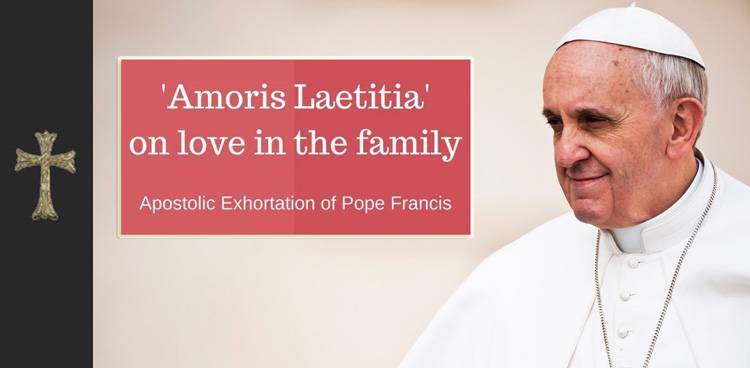Amoris Laetitia: Modernization Without Revolution
The press rushed to predict a major – even revolutionary – shift. Yet upon reading it, there appears to be no major shift, far less a revolution. Expecting one overlooked the heated debate between the synodal fathers and the majority, who fiercely opposed tampering with so much as a hair of the Catholic doctrine concerning marriage.
The exhortation turns out to be business as usual, despite the indisputably novel openness, especially the Pope’s jubilee counsel/urge to endorse his proposal that no one feel excluded from ecclesiastical life. His counsel is really aimed at the extraordinary ministers empowered to Oursocietyhaschangeddramatically; judge – on a case by case basis – “irregular” couples, who, after a process of conversion and The world is rapidly evolving, compelled So: no law, no regulation, no provision.
Case by case. Pope Francis reiterates his long held belief that they should not fall into the trap of rallying behind one irreversible law. But it would be ungenerous not to recognize that the text is a sweeping and cogent outline of the Church’s attitude toward Christian matrimony and the family unit in a complex society increasingly removed from the Catholic tradition, and how it means to disseminate that old and new vision in a world where there exist myriad forms of conjugal life, myriad couples. by an overly individualistic culture, centered on amassing possessions, generate within the family intolerance and aggression.” Many people have been abandoned or decided to take other conjugal routes.
Many face an unpredictable economic future, and raising children, the conversations and arguments new relatives entails, comes at too high a cost. For many, this is all for the good. Nevertheless, says the Pope, to silence the Christian model of the family goes against freedom. penitence, could inch closer to the Eucharist. People who are divorced or remarried “are not excommunicated,” and one must “guide, discern, and integrate weakness” when facing complex or “irregular” situations. Cases should be judged individually: “The divorced who have entered a new union... may find themselves in a variety of different situations which should not be pigeonholed or fit into overly rigid classifications.”
As Francis notes, “In some cases, this can include the help of sacraments. I want to remind priests that the confessional must not be a torture chamber, but rather an encounter with the Lord’s mercy.” So: no law, no regulation, no provision. Case by case. Pope Francis reiterates his long held belief that they should not fall into the trap of rallying behind one irreversible law. But it would be ungenerous not to recognize that the text is a sweeping and cogent outline of the Church’s attitude toward Christian matrimony and the family unit in a complex society increasingly removed from the Catholic tradition, and how it means to disseminate that old and new vision in a world where there exist myriad forms of conjugal life, myriad couples.
Our society has changed dramatically; ignoring that disincarnates the Gospel. The world is rapidly evolving, compelle by new ideas that modify our fundamental values. Right or wrong, that is the state of things. It’s hard to ignore what has become of couples in recent years. Divorce is now our daily bread, and new family models have emerged. On the other hand, “equal consideration needs to be given to the growing danger represented by an extreme individualism which weakens family bonds and ends up considering each member of the family as an isolated unit, leading in some cases to the idea that one’s personality is shaped by his or her desires, which are considered absolute. The tensions caused by an overly individualistic culture, centered on amassing possessions, generate within the family intolerance and aggression.”
Many people have been abandoned or decided to take other conjugal routes. Many face an unpredictable economic future, and raising children, the conversations and arguments new relatives entails, comes at too high a cost. For many, this is all for the good. Nevertheless, says the Pope, to silence the Christian model of the family goes against freedom. Even those with opposing views of marriage would find it hard to imagine marriages based on the sacrament being so obsolete or demanding as to be impractical. Understanding the difficulties of separation and embracing those who live outside the sacrament of marriage does not mean placing fidelity and infidelity on the same plane. Marriage is a wonderful experience, the Amoris Laetitia, and the family unit an undeniable asset.
The Pope’s statement does nothing but reiterate that fact; what else could it do? The media will inevitably concentrate on the few “openings” for “irregulars,” ignoring the fact that the Church may be reconsidering the viability of a holy marriage not open to everyone, better practices for preparing the sacrament, providing counsel to couples, and emphasizing holy matrimony as a Christian vocation. Their focus isn’t primarily those who haven’t done it but those who, having to choose which conjugal route to pursue, do so reasonably and maturely. *
Gennaro Matino teaches Theology and History of Christianity in Naples, where he runs the parish of SS. Trinità. He has written several books and collaborates extensively with both traditional and new media.


































i-Italy
Facebook
Google+
This work may not be reproduced, in whole or in part, without prior written permission.
Questo lavoro non può essere riprodotto, in tutto o in parte, senza permesso scritto.